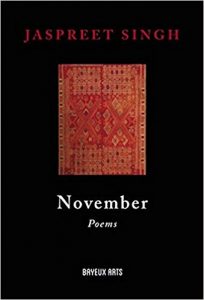November: Poems
by Jaspreet Singh, Bayeux Arts, July 2017
Jaspreet Singh’s new anthology of poems, November, is about memories of pain, grief, migration and mourning, following the 1984 mass murder of Sikhs across India, and the loss – thirty years later – of the author’s mother, a survivor of the massacre. Jaspreet Singh, a writer, poet and research scientist, synthesizes his knowledge of chemistry with poetic imagery through skillful juxtaposition of the complex with the simple. He is as comfortable with Ghalib, Bullhe Shah and Nanak as he is with Primo Levi, Roald Hoffmann, Richard Feynman, Nek Chand and Corbusier:
“Like children on a snow-covered street, I, too, think about stories and molecules. And I will never write a poem which gives priority to either.”
[From the poem “Micro-manifesto”]
A brooding November darkness lurks in the book behind shadows, tempering its composition with false smiles, and infecting everything with the unholy, the impermeable: “dark kalyug,” atoms rising to “roam the bazaars in turned-out toes,” invisible clouds kissing “pages of Gita” but clotting “earth’s inherited laughter.” What remain are stories. But these, too, are threatened by molecules powerful enough to “erase stories, even memories of stories.”
Hidden behind the bright colours of the phulkari – the delicate Punjabi art of embroidery on fabric woven on family charkhas by groups of women sitting in trinjans – are spitballs landing on saris on the streets of Dilli, a city that does not speak “the language of ‘why.’” Resonating behind the sounds of Bhagat Ravi Das’s shabad “madhave tum na toro” (Raag Sorath) is the relentless sound of the blowing wind: “Novembers are dead,” the poet writes, and “mothers are dead.”
Then, there is “Muttersprache” reflecting the connectiveness of language, idiom and mother tongues – English, Hindi, German, Spanish, and Punjabi – sung by “gypsies” in packed buses en route to “Ludhianay tayshun teh.” Punjabi and its dialects can be felt “rivering” towards Malton, Brampton, Paldi, finally coming to rest in Surrey on a “malmal sheet” spread on “a hand-woven jute cot:”
“Sweet tongue
make me fall,
make me rise,
make me play again. Name again.
Unlock ruins riddles, even things
which did not leave
a trace. Teach me
a crisp 3000-year old song. Restore
deep wells within my heart. You are
where my mother lives now.”
[From the poem “Punjabi”]
It is October now, and the month of November is fast approaching. The grass will soon turn to snow to mark another New Year. Jaspreet’s Singh’s poems reignite “the periodicity of Gujarat, Trilokpuri,” reminding us of horrors forgotten like burned out “incense-sticks,” showing us, once again, how to “become Novemberized.”









